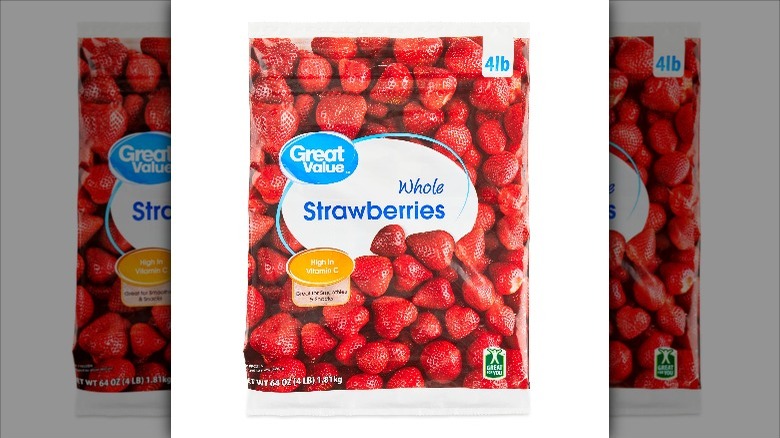The Costco Strawberry Blend Recall Has Expanded To Walmart
You know what's worse than not having strawberries with your favorite cereal? A bowl of hepatitis with milk. Should you have shopped for strawberries at Walmart lately, that's exactly what you might get — at least if the berries were of the frozen variety. If you've been keeping up with your food news, you're surely aware of the Costco frozen strawberry recall. As it turns out, it wasn't just Costco that was affected. Other stores selling the strawberries, which have been linked to a multi-state hepatitis A outbreak, include Aldi, KeHE, Vital Choice Seafood, PCC Community Markets, and HEB, while the strawberries were included in a fruit blend sold by Trader Joe's.
Now, Food Safety News reports that Walmart, too, is selling these suspect strawberries under the Great Value label. If you have a four-pound bag of sliced strawberries or mixed fruit (one that contains strawberries, of course) or you bought the two-pound antioxidant blend, you probably shouldn't eat them. Still, you only have cause to worry if you purchased them in the following states (with all due apologies for the less-than-scintillating lines to follow, although we did arrange the list in alphabetical order so you can give it a quick skim): Arkansas, Arizona, California, Colorado, Hawaii, Iowa, Idaho, Illinois, Indiana, Kansas, Kentucky, Louisiana, Maryland, Michigan, Minnesota, Missouri, Montana, North Dakota, Nebraska, Nevada, New York, Ohio, Oklahoma, Oregon, Pennsylvania, South Dakota, Texas, Utah, Virginia, Wisconsin, West Virginia, and Wyoming.
This hepatitis outbreak has yet to prove fatal
So, if you've consumed contaminated strawberries from Costco, Walmart, or another store, should you be worried? So far, only nine people have shown symptoms of hepatitis A that can be linked to these frozen berries, and of these people (all of whom live on the West Coast), only three have required a hospital stay. That being said, hepatitis symptoms may not show up for nearly two months or at all, so the only way to know for sure whether you have the disease is to visit your doctor. Even if you haven't eaten any of these biohazard berries, there is also a chance that you could become ill if another member of your household has. While Ohio State University notes that only 7% of the approximately 1,500 cases of hepatitis A that occur in the U.S. each year are foodborne, the other 93% come from "environmental contamination," which can mean person-to-person contact.
Should you be wondering whether heating those frozen berries might kill off any potential hepatitis A virus, the answer is yes, as long as the temperature reaches 185 degrees Fahrenheit. As to whether you should even attempt such a thing, that's another story. James E. Rogers, Ph.D., director of food safety testing and research at Consumer Reports, goes with a 'better safe than sorry' approach. As he cautions, "It's not a good idea to try to salvage your berries by cooking them when you know there's a chance that they could be contaminated."

